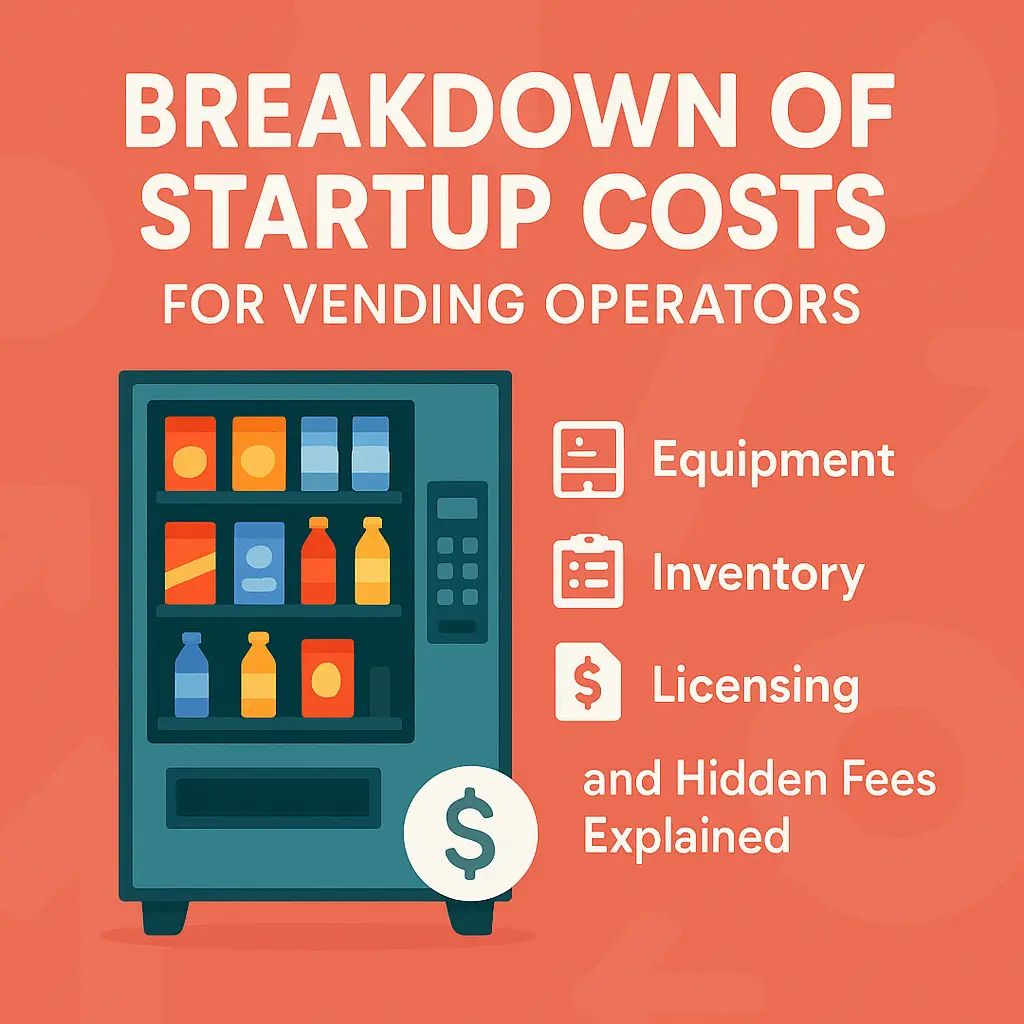Cost to Start a Vending Business
Breakdown of startup costs for vending operators. Equipment, inventory, licensing, and hidden fees explained.
Back to Vending Business Startup ResourcesBreakdown of startup costs for vending operators. Equipment, inventory, licensing, and hidden fees explained.
Back to Vending Business Startup ResourcesStart your 30-day free trial and get instant SMS and email alerts whenever a local business needs vending service. These are real location leads to help you grow your route — you decide which ones to buy, no obligations or contracts.
![]() Upfront costs vary by machine type and condition
Upfront costs vary by machine type and condition
![]() Licensing and permits vary by state and location
Licensing and permits vary by state and location
![]() Startup inventory can cost $300 to $1,000 per machine
Startup inventory can cost $300 to $1,000 per machine
30 days free, then $39 / month.
No Commitment. Cancel Anytime.

Starting a vending machine business has relatively low barriers to entry, but the initial costs can vary significantly based on your location, equipment preferences, and operational strategy. Understanding the startup costs will help you avoid surprises and build a more sustainable vending operation.
The biggest upfront cost is the vending machine itself. Basic mechanical machines can cost as little as $1,200 to $2,500, while smart combo machines that accept contactless payments and provide inventory tracking may run from $3,500 to $7,000 or more. Used machines are an option for reducing startup costs, but may require refurbishments or tech upgrades.
Inventory is the second-largest expense, usually ranging from $300 to $1,000 per machine depending on size and product mix. If you're stocking snacks and beverages, plan to restock weekly or biweekly — which means cash flow planning is critical early on. Many new operators underestimate how quickly the cost of replenishing product can add up.
Permits and licensing vary widely by city and state. Expect to pay anywhere from $50 to several hundred dollars annually for business registration, sales tax permits, and health department approvals (especially if you're offering perishable food). Be sure to also account for liability insurance, which may range from $200 to $500 per year.
Other startup expenses include transportation (truck or van for restocking), credit card processing fees, machine storage if you’re not placing immediately, and equipment like change counters or inventory trackers. If you're scouting and negotiating locations yourself, plan to invest significant time — or consider hiring a service to streamline setup.
For a deeper dive into scouting locations or pitching prospective accounts, check out our guide on how to evaluate vending locations. You can also explore successful cold calling techniques for vending operators.
Vending Exchange connects vending operators with real businesses actively looking for vending services—including traditional machines, AI coolers, and office coffee. Get instant SMS and email alerts when new opportunities are available in your area. No contracts or monthly fees—just buy the leads you want. Start your free 30-day trial today and grow your vending business on your terms.
The average total startup cost ranges from $3,000 to $10,000 depending on equipment, inventory, and service model.
New machines offer modern features and fewer repairs, but used machines are more affordable upfront. The choice depends on your budget and tech needs.
Expect to spend $300 to $1,000 per machine for initial stock depending on product mix and machine size.
Yes, most states require a business license, sales tax permit, and potentially a health permit if selling food and beverages.
Common hidden costs include machine storage, credit card reader fees, maintenance, insurance, and transportation.
Yes, many suppliers offer financing options or leasing plans, which can reduce initial cash outlays but carry interest.
Evaluate locations based on foot traffic, dwell time, competitive access, and customer type. Services can assist in finding premium locations.
Liability insurance typically costs between $200 and $500 annually, depending on the size of your operation.
Yes, fees may include inventory restocking, card processing, commission to location hosts, and fuel or vehicle costs.
Many new operators start with 1 to 3 machines to minimize risk and learn operations before scaling up.